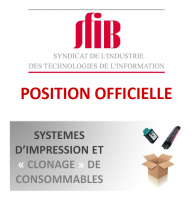The French OEM association’s clones publication is now available to English readers.
The Syndicat de l’industriedes technologies de l’information (or Industry Union of Information Technology) recently revealed its stance on clones and the threat they pose to both OEMs and remanufacturers, as The Recycler reported.
The association, which contains OEMs including Brother, Lexmark and Xerox, stated that the European market is experiencing an “emerging proliferation of cartridges made from new parts but not carrying the brand of printer manufacturers”, and its publication came after ETIRA’s Guide to Clones was launched last year (you can view an English version of that here).
The document, which it refers to as “the official position of the industrial sector”, gives definitions of clones, the agreement of commitment between association members and the initiatives undertaken by its members to tackle the spread of clones. You can view it here in English.
The document features an executive overview of the market, definitions of the different types of printer cartridge models available in the global industry, and discusses both the emergence of clones, how they are sold and the “apparently attractive offer” that clones manufacturers propose to unknowing consumers.
The SFIB refers to remanufactured products as “used cartridge[s] which undergo all or part of […] procedures for restoring the product to working condition” including “cleaning, replacement of parts, and ink/toner filling tests”. It adds that “these cartridges are marketed under various brand names or labels”, and that the information on “the packaging and on the cartridge itself clearly shows the customer that this product is different from the initial new OEM cartridge”.
It defines clones as cartridges “manufactured with new components and materials by a third-party manufacturer, not the OEM”, and notes that the use of new components “is not in itself a guarantee of quality”. The definition adds that clones are “manufactured from copies of the original components” and that similarly “the chemical formulation of the ink or the toner is different from the OEM’s”.
Noting that worldwide sales of clones have “increased so dramatically […] during the last three or four years” that French manufacturers, distributors and remanufacturers have been affected, the SFIB adds that OEMs “are taking an increasing number of measures” to protect their intellectual property against clones, with another section looking at four risks in purchasing clones that include high risk of intellectual property infringement, fraud, environmental and economic impacts.
The document ends with a “call to action” imploring dealers and customers to do the right thing in not purchasing cloned consumables, noting that the association’s members are “up in arms” about the spread and threat of clones.

